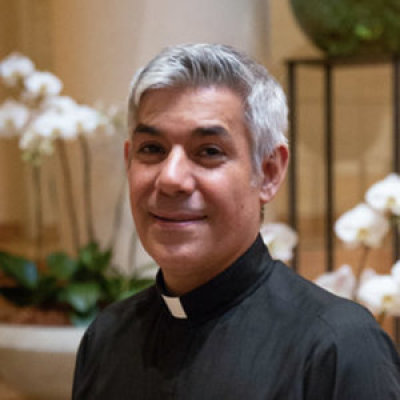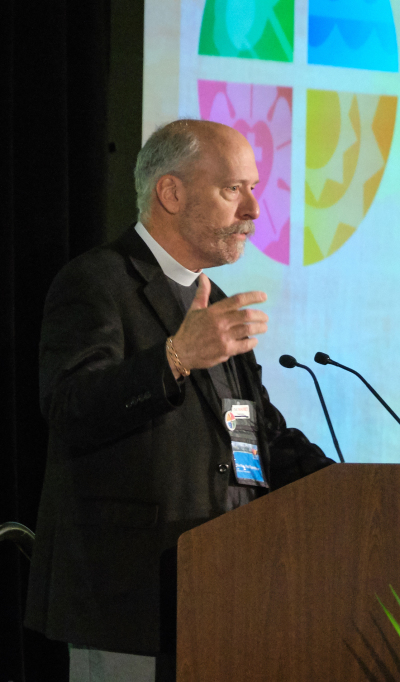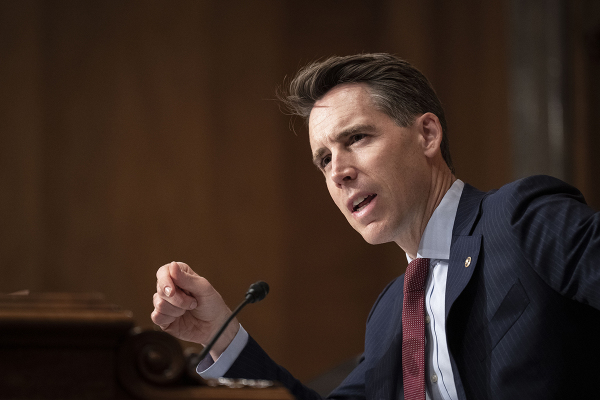At least 39 dead, scores more infected as COVID-19 devastates Latino parishes in NY Lutheran Church

NEW YORK — Since late March, Pastor Fabián Árias of Saint Peter’s Lutheran Church in Midtown Manhattan has been busy making announcements of the dead, the sick, and comforting the bereaved because of the new coronavirus.
At least 39 people connected to his diverse, predominantly Latino church community, including 5% of his 250-member congregation, have died in the last month. Another 74 members of the church are also currently battling or have battled coronavirus infections.
“In this moment it’s a very, very difficult situation because the family [member] is sick or the family [member] has died,” Árias told The Christian Post in an interview Wednesday.

In virtual masses broadcast on Facebook on Wednesdays and Sundays, Arias has been listing the names of the sick and the dead so his congregants can pray and draw strength from their community. Sometimes there would be pictures of the victims. The latest death was a week ago.
“We mention all names every Wednesday and every Sunday. We mention that for prayers,” Árias said.
While other Latino church communities in the Metropolitan New York Synod of the Evangelical Lutheran Church in America haven’t had as many deaths as Saint Peter’s Lutheran Church, 25% to 30% of parishioners across its five Latino parishes have tested positive for the virus. Officials say the staggering infection rate is due to many members of the Latino community working in essential service areas such as delivery or maintenance. Many who have lost jobs are also being doubly devastated by the economic fallout from the pandemic due to their undocumented immigrant status.
The Metropolitan New York Synod
The Metropolitan New York Synod covers all five boroughs of New York City, all of Long Island, and seven upstate counties. Its New York City congregations, particularly those that serve Latinos, have been hardest hit, Synod Bishop Paul Egensteiner said.
“The reaction and impact of the virus has been different in all those places. In New York City and the five boroughs, the impact has been heavy and in some cases very disturbing and devastating. In other places like in upper north counties, they really haven’t had much of an impact personally,” the bishop said.
Christopher Vergara, president of St. Peter’s, told CP that those who attend St. Peter’s Church are largely immigrants, people of color, and from low-income households. "We know those communities are being hit hardest. We do a lot of work and we consider them part of our church family working with the homeless community, the feeding program."

“When you start taking all the intersections of the demographics of the members of our church, I think that’s how we get to why it’s been hit so hard. And it’s been primarily in our Hispanic communities and our immigrant communities that we’ve had the most deaths,” he added.
At one Latino parish in Jamaica, Queens, Egensteiner said the pastor reported 22% of the congregation had been infected.
“They are very grateful that in their congregation in Jamaica, Queens, they have not lost anyone to the virus,” Egensteiner said.
The coronavirus is also not the only threat to the Latino church communities. Undocumented parishioners are also facing new ones triggered by the pandemic.
“I was also talking to one of our pastors out in Long Island and she said that in addition to the specific health toll, the economic toll and the toll on anxiety on the congregation has been very, very heavy with landlords wanting to evict people who can’t pay their rent,” he said.
“Many of the people, they are undocumented so they don’t have recourse to healthcare, they don’t have recourse to having their eviction prevented. In some cases, some of our members who are told they were going to be evicted were told that the way the landlord was going to make that happen was not by going through the courts but simply by calling ICE and letting them know. And so that scares our folks to death and what are they supposed to do? They are more victims to the virus than other people,” he said.
An estimated 83% or 9.2 million of the 11.1 million people estimated to be living in the United States illegally are Christians from Latin America and the Caribbean, according to a study by the Pew Research Center's Forum on Religion & Public Life.
As a declared sanctuary church, the ELCA attracts many undocumented Christians. Those who have not been able to work because of the coronavirus are now dependent on the church for support since they cannot access government aid.
Egensteiner said his office has been providing funding to parishes to help congregants stay in their homes by paying rent and to help run food pantries and food kitchens.
“These very vulnerable populations. When they lose their jobs, they don’t have financial resources,” he said.
He praised Árias for the way he has responded to his church community despite the staggering number of coronavirus deaths and infections.
“Father Arias is an incredible human being and an incredible pastor and has been doing his best to serve his church community. I talked to him on Saturday. He was on his way to conduct a burial over in New Jersey for one of the members. He’s been present to them, doing funerals and also making sure they have food. So he’s been personally delivering food to members of the congregation,” he said.
Action
Egensteiner said the day after the World Health Organization declared the coronavirus a pandemic on March 11, he sent a letter to all parishes in the synod, advising the suspension of all in-person services after March 15 and most of the churches complied.
While the Latino congregants suspended in-person church attendance, many did not have the option to work remotely and many worked without personal protective equipment.
“This all comes about from the need to work and they are getting sick at work without having appropriate and sufficient personal protective equipment. So they get sick, they come home, they are living in family groups with a lot more people and family members get sick,” Egensteiner said.
He said he would meet with Árias to help with food distribution and show moral support and has directed his staff to meet with Latino pastors and provide them with the support they need.
Árias, whose congregation continues to reel from the multiple deaths, said the pandemic was particularly difficult for congregants grieving family members because of ongoing restrictions on funerals.
“All of the families they want to celebrate the funeral and it's impossible for them,” he said. “… It’s also difficult in this moment with the funeral homes.”
The first coronavirus death in the community came on March 20 when the secretary of Árias’ parish lost both her father and brother to the virus. Other family members soon contracted the virus too.
After more than a month, however, Árias is just focused on keeping his congregants inspired and fed.
“All the time we are in contact with our people. We call, we ask 'how are you?' If they have corona [or] no corona. We really, that’s important for us. The people, of course, they want to close their eyes (they don’t want to watch the news). The people are really scared. They are really very scared,” he said. “It’s a very confusing time. It’s a very hard time for us.”
When asked how he continues to serve despite the challenges he faces every day, he said he draws strength from Christ.
“I pray because it’s my faith. Other times I pray with people. Christ is my strength, Christ is my support, Christ is my reason why I continue to work with the people,” he said.
Life after the coronavirus
Looking ahead, Vergara said while many churches across the country have been clamoring to reopen, it will be a while before his congregation holds in-person services again.
“I think it’s going to be a long time before our congregation is going to be able to gather in person together in our parish. We want to listen to what our government officials, our health officials are telling us. We have our guidelines that we get from our synod, our bishop and our national church that we want to follow as well and be extra careful,” he said.
“As Lutherans, one of the things that we love to do is sing and to come together. Singing in the same space may not be possible for a while because that promotes spread and puts people at risk. So these are the sort of things that we are, as a community, starting to put our minds to.
“In the beginning, it was to transition quickly and say how do we do church now? And then I think now that we’ve been in this form for a while, it’s fighting the desire to just quickly get back to what was and figure out how we will safely and responsibly be able to come back together as a church.”
And while many congregations are reeling in the devastation of the pandemic, Egensteiner believes that the full impact of the loss suffered by churches won’t be fully appreciated until they come together again in-person.
“My suspicion, not just for our Latino congregations but for all our congregations, is that even though you see names and you know people, and that certainly happened to me, the impact of it doesn’t dawn on you until you come back together and you start looking around at empty spaces in the pews or you go to talk to a friend at coffee hour and you’re devastated because, oh yeah, they’re not there,” he said. “That’s when it’s really going to have a very deep emotional and spiritual impact.”
Both Árias and Vergara also urged fellow Christians to be careful about rushing to reopen their churches too early.
“Care for life, protect the life, respect life because life is a gift from God,” Árias said. “This is a very important mission for us, especially in this month. I really sometimes [get] angry, but I’m very disappointed that some [churches] are pushing to open everything early. We need to be careful.”
Both ministers agreed that because their church is central and shares space with two art galleries in Midtown, they will have to be strategic with reopening.
“What’s important for Christians and for most people of faith, and specifically for Lutherans, is the idea of caring for our neighbors. God loves me and I share God’s love with others. And I think that is what we’re being called to do at this time and we must make decisions in care of, in service of, and responsibility for not only just … our members but our communities in which we are doing ministry,” Vergara said. “We have to take that responsibility and that care as a mandate not only from the government and health officials but from our God and take that very seriously.”





















